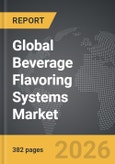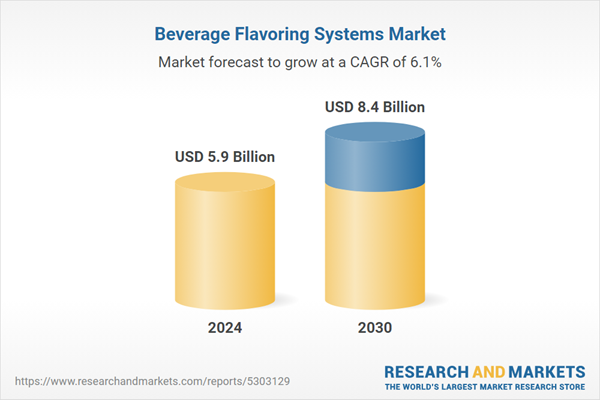Global Beverage Flavoring Systems Market - Key Trends and Drivers Summarized
Why Are Beverage Flavoring Systems Essential in the Drink Industry?
Beverage flavoring systems play a crucial role in the drink industry, allowing manufacturers to create unique, appealing flavors that cater to diverse consumer preferences and market trends. These systems involve a blend of natural and artificial flavors, sweeteners, acids, and other ingredients that together define a beverage's taste profile. From carbonated sodas and fruit juices to energy drinks, teas, and plant-based alternatives, flavoring systems are integral to achieving the desired taste, aroma, and mouthfeel that make beverages distinct and enjoyable. Given the competitive nature of the drink industry, flavor differentiation is essential for brands to stand out and build consumer loyalty. By using specialized flavoring systems, companies can create products that appeal to specific target markets, meet demands for unique or exotic flavors, and align with growing preferences for healthier options. Additionally, as more consumers seek low-sugar, low-calorie, and natural ingredients, beverage flavoring systems have evolved to incorporate natural flavors, sugar substitutes, and functional ingredients, making them an essential tool in aligning product offerings with changing consumer expectations.How Are Beverage Flavoring Systems Tailored to Meet Consumer Trends?
Beverage flavoring systems are carefully crafted to keep up with rapidly changing consumer preferences, which today emphasize not only taste but also health, wellness, and novelty. Health-conscious consumers are increasingly drawn to beverages that contain natural ingredients, lower sugar levels, and functional benefits. In response, flavoring systems have integrated natural extracts, fruit-based sweeteners, and botanicals to create flavors that align with these values. For example, the demand for natural and organic products has led to flavoring systems that utilize real fruit extracts, plant-based ingredients, and low-calorie natural sweeteners like stevia and monk fruit. Functional beverages - those that offer added health benefits, such as probiotics, antioxidants, or adaptogens - also require sophisticated flavoring systems to mask the sometimes bitter or earthy taste of active ingredients without compromising taste. Additionally, there is a growing interest in exotic and nostalgic flavors, with flavoring systems now incorporating tropical fruits, herbal notes, and international spices to meet the demand for unique taste experiences. By carefully adapting to these consumer trends, beverage flavoring systems help brands create innovative products that satisfy the evolving tastes and health-conscious choices of today's consumers.What Role Does Technology Play in Advancing Beverage Flavoring Systems?
Technology has significantly advanced beverage flavoring systems, allowing for precise control over taste, aroma, and nutritional composition while enhancing product stability and shelf life. Innovations in flavor encapsulation, for example, enable manufacturers to preserve the freshness and potency of flavors during storage and processing, releasing them only when the beverage is consumed. Microencapsulation technology, commonly used for sensitive flavors and ingredients, protects compounds from degradation due to heat, light, or oxygen, making it ideal for ready-to-drink beverages that require a long shelf life. Advanced extraction techniques, such as cold-pressing and CO2 extraction, are also widely used to produce high-quality natural flavors, capturing the full spectrum of aroma and taste from fruits, herbs, and spices without altering their nutritional value. Additionally, data analytics and artificial intelligence (AI) are transforming flavor development by predicting consumer preferences, optimizing flavor combinations, and accelerating the product development process. By simulating flavor profiles and analyzing sensory data, AI-powered systems can create balanced, appealing flavors with reduced trial and error. These technological advancements have enabled beverage companies to produce sophisticated flavoring systems that meet the highest standards for quality, consistency, and innovation, giving them a competitive edge in a crowded market.What Is Driving the Growth in the Beverage Flavoring Systems Market?
The growth in the beverage flavoring systems market is driven by increasing consumer demand for diverse, health-oriented, and innovative beverage options, along with advancements in flavoring technology and growing investment in research and development. As global markets expand, consumers are seeking a wider variety of flavors and healthier beverage choices, prompting brands to innovate with natural, exotic, and functional flavor profiles. The rising popularity of low-calorie and sugar-free drinks has led to an increase in demand for flavoring systems that use natural sweeteners and ingredients that appeal to health-conscious consumers without sacrificing taste. Additionally, the surge in demand for functional beverages, such as those with added vitamins, antioxidants, or probiotics, has further stimulated market growth, as these products require complex flavoring systems to balance and mask the flavors of active ingredients. Technological advancements, particularly in encapsulation and extraction, have enabled manufacturers to preserve flavor integrity, enhance product stability, and improve the nutritional profile of their offerings, aligning with consumer expectations for quality and transparency. Increased investment in R&D is also a significant factor, as beverage companies prioritize the development of new flavors and formulations to stay competitive. Furthermore, the shift toward sustainable and eco-friendly products is pushing brands to incorporate natural, ethically sourced ingredients, influencing the evolution of flavoring systems to support sustainability initiatives. Together, these factors are driving the growth of the beverage flavoring systems market, as companies strive to meet changing consumer preferences, innovate with cutting-edge technology, and cater to a global market that values variety, health, and quality in beverage choices.Report Scope
The report analyzes the Beverage Flavoring Systems market, presented in terms of market value (US$ Thousand). The analysis covers the key segments and geographic regions outlined below.- Segments: Ingredient (Flavoring Agents, Flavor Carriers, Flavor Enhancers, Other Ingredients); Beverage Type (Non-Alcoholic, Alcoholic); Form (Liquid, Dry).
- Geographic Regions/Countries:World; United States; Canada; Japan; China; Europe (France; Germany; Italy; United Kingdom; Spain; Russia; and Rest of Europe); Asia-Pacific (Australia; India; South Korea; and Rest of Asia-Pacific); Latin America (Argentina; Brazil; Mexico; and Rest of Latin America); Middle East (Iran; Israel; Saudi Arabia; United Arab Emirates; and Rest of Middle East); and Africa.
Why You Should Buy This Report:
- Detailed Market Analysis: Access a thorough analysis of the Global Beverage Flavoring Systems Market, covering all major geographic regions and market segments.
- Competitive Insights: Get an overview of the competitive landscape, including the market presence of major players across different geographies.
- Future Trends and Drivers: Understand the key trends and drivers shaping the future of the Global Beverage Flavoring Systems Market.
- Actionable Insights: Benefit from actionable insights that can help you identify new revenue opportunities and make strategic business decisions.
Key Questions Answered:
- How is the Global Beverage Flavoring Systems Market expected to evolve by 2030?
- What are the main drivers and restraints affecting the market?
- Which market segments will grow the most over the forecast period?
- How will market shares for different regions and segments change by 2030?
- Who are the leading players in the market, and what are their prospects?
Report Features:
- Comprehensive Market Data: Independent analysis of annual sales and market forecasts in US$ Million from 2024 to 2030.
- In-Depth Regional Analysis: Detailed insights into key markets, including the U.S., China, Japan, Canada, Europe, Asia-Pacific, Latin America, Middle East, and Africa.
- Company Profiles: Coverage of players such as Archer Daniels Midland Company (ADM), Cargill, Döhler, Firmenich, Flavorchem Corporation and more.
- Complimentary Updates: Receive free report updates for one year to keep you informed of the latest market developments.
Some of the 52 companies featured in this Beverage Flavoring Systems market report include:
- Archer Daniels Midland Company (ADM)
- Cargill
- Döhler
- Firmenich
- Flavorchem Corporation
- Frutarom
- Givaudan
- International Flavors and Fragrances (IFF)
- Kerry
- Mane
This edition integrates the latest global trade and economic shifts into comprehensive market analysis. Key updates include:
- Tariff and Trade Impact: Insights into global tariff negotiations across 180+ countries, with analysis of supply chain turbulence, sourcing disruptions, and geographic realignment. Special focus on 2025 as a pivotal year for trade tensions, including updated perspectives on the Trump-era tariffs.
- Adjusted Forecasts and Analytics: Revised global and regional market forecasts through 2030, incorporating tariff effects, economic uncertainty, and structural changes in globalization. Includes historical analysis from 2015 to 2023.
- Strategic Market Dynamics: Evaluation of revised market prospects, regional outlooks, and key economic indicators such as population and urbanization trends.
- Innovation & Technology Trends: Latest developments in product and process innovation, emerging technologies, and key industry drivers shaping the competitive landscape.
- Competitive Intelligence: Updated global market share estimates for 2025, competitive positioning of major players (Strong/Active/Niche/Trivial), and refined focus on leading global brands and core players.
- Expert Insight & Commentary: Strategic analysis from economists, trade experts, and domain specialists to contextualize market shifts and identify emerging opportunities.
Table of Contents
Companies Mentioned (Partial List)
A selection of companies mentioned in this report includes, but is not limited to:
- Archer Daniels Midland Company (ADM)
- Cargill
- Döhler
- Firmenich
- Flavorchem Corporation
- Frutarom
- Givaudan
- International Flavors and Fragrances (IFF)
- Kerry
- Mane
Table Information
| Report Attribute | Details |
|---|---|
| No. of Pages | 382 |
| Published | January 2026 |
| Forecast Period | 2024 - 2030 |
| Estimated Market Value ( USD | $ 5.9 Billion |
| Forecasted Market Value ( USD | $ 8.4 Billion |
| Compound Annual Growth Rate | 6.1% |
| Regions Covered | Global |









